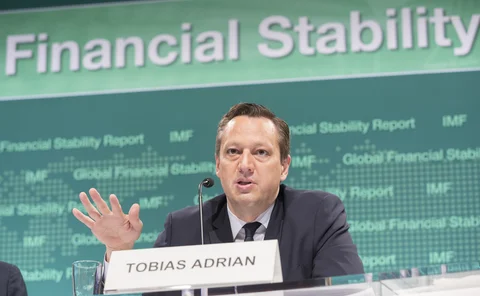Economics
Monetary policy strongly influences income inequality – DNB paper
Central banks should not overlook income distribution effects, researchers say
RBNZ paper stresses need to understand global shocks
Analysing global shocks ‘increasingly important’ for central banks, says article
IMF flags high public debt in Middle East oil exporters
Oil producers in the Mena region are expected to average budget deficits of 4% of GDP in 2019
The IFF China Report 2019
Insight and perspectives from the world's leaders, premier policy-makers and financiers
The IFF China Report 2019: The Bay Area Development
Located at the start of the Maritime Silk Road, the Guangdong–Hong Kong–Macau Greater Bay Area seeks to harness advanced technology and green finance to catch up with the economically advanced bay areas of New York, San Francisco and Tokyo.
Sluggish investment was key factor in weak post-crisis recovery – IMF research
Output losses affected countries regardless of whether they had suffered a banking crisis
Argentine peso plummets as political risk rises
Rising inflation and recession increase popularity of former president Cristina Kirchner
Trump’s tariffs aren’t hurting eurozone yet, says ECB
Economists warn of danger to US in escalating trade war
The IFF China Report 2019: Financial deepening, fintech development and green financing
The past 40 years have seen China transform from a recipient of global aid to a major economic centre in its own right. China is now seeking to deepen its markets, gradually open its borders to global financial flows, and promote new and innovative forms…
Fintech and the future – Improving financial literacy
Li Dongrong, president of the National Internet Finance Association of China and former deputy governor of the People’s Bank of China, explains how financial technology can aid sustainable growth, transform the structure of financial markets and promote…
Eurozone needs central stabilisation fund to secure fiscal stability – ECB research
Unlike other monetary unions, the region’s federal budget plays a very limited role
Europe needs supervisory standards for climate risks – Lautenschläger
ECB official says standards should be worked out rapidly in modular form
Argentina imposes price controls to tackle hyperinflation
Central bank governor apologises as year-on-year inflation figures rise 54.7%
Equity market uncertainty can reduce real GDP – researcher
Equity market volatility in Q4 2018 could reduce the policy rate path by 50bp, says researcher
The IFF China Report 2019: The Belt and Road Initiative
Over the past five years, China has invested more than $70 billion in Belt and Road Initiative (BRI) countries, of which there are now in excess of 100. Leading Chinese and international policy-makers explain how BRI efforts are progressing. This section…
The Belt and Road Initiative 2019 Survey – A new driver for globalisation?
The second Belt and Road Initiative (BRI) Survey of 28 central banks reveals that they view the BRI as a major driver of globalisation, with a high percentage of respondents expecting the initiative to provide a significant boost to GDP. So far,…
China’s Q1 GDP beats expectations on surging industrial production
But the recovery may not prove durable, economists warn
Namibia’s central bank slashes economic growth forecast
Bank of Namibia reduces predicted GDP growth to just 0.3%
IMF’s Adrian says central banks should disclose climate risk exposure
Data gaps make it harder for central banks to set appropriate climate stress tests, he says
Hard IMF conditions deter borrowers from coming back – ECB paper
Researchers use data on most IMF programmes since 1992 to investigate “IMF stigma”
The IFF China Report 2019: Redesigning the international trading and monetary system
Reform of the financial system that brought about the 2007–08 financial crisis has not gone far enough and advanced and emerging market economies must find a more co-operative way forward to ensure globalisation can continue.
The turmoil test for emerging and advanced economies
Greater integration between advanced and emerging market economies during globalisation has made both more susceptible to risk of spillover – financial contagion and volatility. As the US continues to normalise its monetary policy, deputy governor of…
Internationalising renminbi – Hong Kong leads the way
Hong Kong’s advantages in technology, talent and infrastructure make it best placed to form the primary transaction and risk management network for the overseas offshore renminbi market, argues Zhou Chengjun, IFF Academic Committee member and deputy…
An international system for all
Reform of the system that brought about the financial crisis in 2007–08 has not gone far enough, writes Zhu Xian, IFF vice-chairman and vice-president of the New Development Bank. Developing countries are demanding greater influence in global economic…























